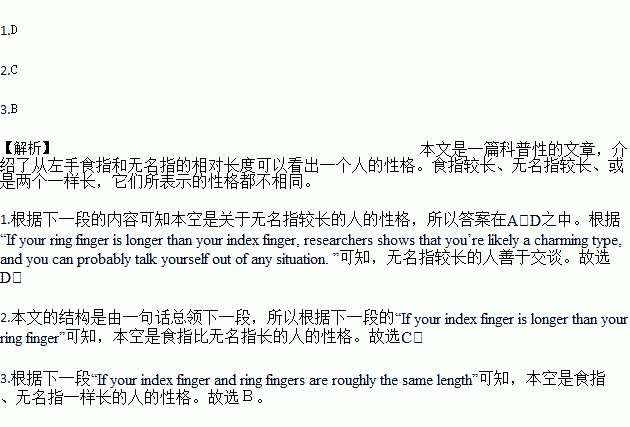题目内容
Look at your three middle fingers of your left hand. Is your index finger(食指)longer than your ring finger? Is your ring finger longer than your index finger? Or are the two the same height? Find the scenes that best matches your hand and see if it is an accurate description of your personality
1..
If your ring finger is longer than your index finger, researchers shows that you’re likely a charming type, and you can probably talk yourself out of any situation. Others often find this personality type irresistible and will go to great lengths to help you. You’re more likely to take risks, and you’re good at problem-solving. People in this category make great engineers, soldiers and crossword-puzzle solves.
2..
If your index finger is longer than your ring finger, chances are you are full of confidence—possibly even to the point of being over-confident and arrogant. You are not necessarily introverted, but you do enjoy time to yourself, especially when you’re trying to complete a project. You are a goal-oriented(面向目标的)go-getter who can make things happen, but you may be shy when it comes to taking the first step in a relationship. You are also probably happy with what you have, but you’re always wishing for more.
3..
If your index finger and ring fingers are roughly the same length, you are likely to avoid conflict at all costs and seek to keep the peace in your relationships. You are well-organized, faithful and pitiful. But deep down under all of that caring and peace-loving, you also have a bad temper that can scold unexpectedly when you’re pushed too far. You will try your hardest to avoid a fight,hut God helps the person who pushes you into one!
A. Longer ring finger: The Hardworking One
B. Index and ring finger are the same length: The Peacemaker
C. Longer index finger: The (Over) Confident One
D. Longer ring finger: The Sweet Talker
 阅读快车系列答案
阅读快车系列答案
